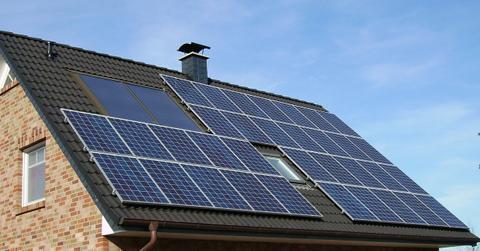Vermont Moves Toward Green Energy With Help From Utility Company
Imagine if utility companies didn't make money by charging you for energy, but instead by partnering with you on power production. That’s the goal of Green Mountain Power, a utility company in Vermont making homes sources of their own energy.
Updated May 26 2019, 2:53 p.m. ET
Imagine if the role of a utility company wasn’t to make money by charging you for energy, but instead to partner with you on power production. That’s the goal of Green Mountain Power, a local utility company in Vermont making homes, neighborhoods and towns sources of their own energy through a program turning large-scale transmission lines into small-scale power systems. Consider it a glimpse of how power grids will work in the very near future.
A fresh take on how utilities ought to work.
Green Mountain Power (GMP) in 2014 became the first energy utility company to register as a B Corp, has made headlines in the last several years for doing the unthinkable: actually helping its customers cut down on energy costs. That included the company’s eHome program that offered “energy makeovers” to clients in order to reduce utility bills and conserve resources.
In 2015 the company offered various buying and leasing options for Tesla Powerwall batteries. That program was expanded in May with a new package offering the battery for just $15 every month for 10 years (or a paid-in-full option for $1,500) that includes a Nest thermostat and other software allowing residents to control home energy by app.
And now, GMP is helping its customers get off the grid once and for all.
Green Mountain Power’s CEO is thinking big.
The green programs are the brainchild of Mary Powell, who became CEO of GMP in 2008 and immediately began the ambitious work of greening a utilities company.
Since then, GMP has ballooned from serving 88,000 customers to 260,000 today. The programs from the utility company keep rolling out, and have led to Rutland having the most solar power per capita in New England, among other milestones.
Instead of using power, we can all just make our own.
Getting homes, neighborhoods and towns off-grid means turning them into their own power sources—a move that provides many returns, environmentally and economically.
“Customers, especially in Vermont with the energy-independence values that people have, want to move more toward self-generation,” Powell told the New York Times. She added that her hope is to turn the power-hungry electric system into a “community-, home- and business-based energy system.”
Financially, having homes off-grid means fewer fees the utility has to pay regional transmitters. Environmentally, that also means batteries can offset energy use in homes, neighborhoods and towns utilizing the program, thereby lowering carbon emissions. An example of this program in motion is a nearby low-income development that GMP got off-grid for two hours for an estimated $275 savings in transmission. That’s just a drop in the bucket for how much could be saved—by GMP and its customers—if renewable energy was being tapped 24 hours at a time by entire towns.
Putting the controls in the hands of consumers also means increasing their ability to manage their at home energy use. That too lowers consumption—and bills.
Green Mountain Power’s system is infinitely replicable.
GMP’s design for creating off-grid communities demonstrates almost endless potential for neighborhoods and towns throughout the United States, and even the world.
“Having more customers go off-grid may allow GMP to retire more line sections over time, reducing maintenance costs that will directly lower costs for all customers,” GMP says on its website. That means increased savings for utility company and consumer alike. And that’s an idea everyone—for financial and environmental reasons—can easily get behind.
